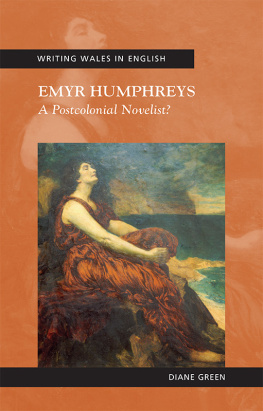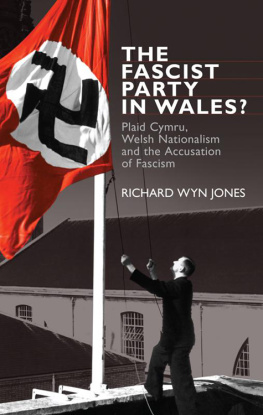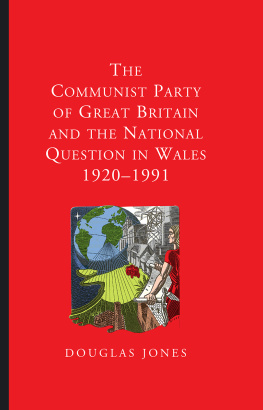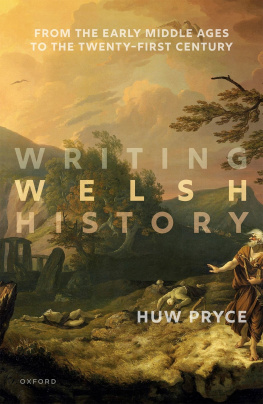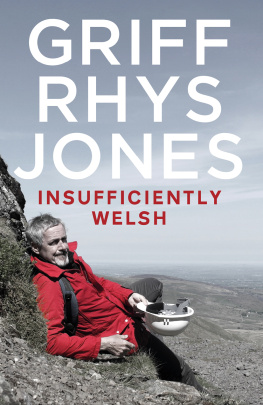Contents
Emyr Humphreys
Writing Wales in English

CREW series of Critical and Scholarly Studies
General Editor: Professor M. Wynn Thomas
(CREW, Swansea University)
This CREW series is dedicated to Emyr Humphreys, a major figure in the literary culture of modern Wales, a founding patron of the Centre for Research into the English Literature and Language of Wales, and, along with Gillian Clarke and Seamus Heaney, one of CREWs Honorary Associates.
Other titles in the series
Stephen Knight, A Hundred Years of Fiction (978-0-7083-1846-1)
Barbara Prys-Williams, Twentieth-Century Autobiography (978-0-7083-1891-1)
Kirsti Bohata, Postcolonialism Revisited (978-0-7083-1892-8)
Linden Peach, Contemporary Irish and Welsh Womens Fiction (978-0-7083-1998-7)
Chris Wiggington, Modernism from the Margins (978-0-7083-1927-7)
Sarah Prescott, Eighteenth-Century Writing from Wales (978-0-7083-2053-2)
Hywel Dix, After Raymond Williams: Cultural Materialism and the Break-Up of Britain (978-0-7083-2153-9)
Matthew Jarvis, Welsh Environments in Contemporary Poetry (978-0-7083-2152-2)
Harri Roberts, Embodying Identity: Representations of the Body in Welsh Literature (978-0-7083-2169-0)
Emyr Humphreys
A Postcolonial Novelist?
Writing Wales in English
DIANE GREEN

Diane Green, 2009
All rights reserved. No part of this book may be reproduced in any material form (including photocopying or storing it in any medium by electronic means and whether or not transiently or incidentally to some other use of this publication) without the written permission of the copyright owner except in accordance with the provisions of the Copyright, Designs and Patents Act 1988 or under the terms of a licence issued by the Copyright Licensing Agency Ltd, Saffron House, 610 Kirby Street, London, EC1N 8TS. Applications for the copyright owners written permission to reproduce any part of this publication should be addressed to The University of Wales Press, 10 Columbus Walk, Brigantine Place, Cardiff, CF10 4UP.
www.uwp.co.uk
British Library Cataloguing-in-Publication Data
A catalogue record for this book is available from the British Library.
ISBN 978-0-7083-2217-8
e-ISBN 978-1-7831-6369-4
The right of Diane Green to be identified as author of this work has been asserted by her in accordance with sections 77, 78 and 79 of the Copyright, Designs and Patents Act 1988.
The publishers wish to acknowledge the financial support of the Higher Education Funding Council for Wales in the publication of this book.
The publisher has no responsibility for the persistence or accuracy of URLs for any external or third-party internet websites referred to in this book, and does not guarantee that any content on such websites is, or will remain, accurate or appropriate.
Cover image: Branwen by Christopher Williams MairRabagliatti. Reproduced by permission of City and County of Swansea: Glynn Vivian Art Gallery Collection.
The aim of this series is to produce a body of scholarly and critical work that reflects the richness and variety of the English-language literature of modern Wales. Drawing upon the expertise both of established specialists and of younger scholars, it will seek to take advantage of the concepts, models and discourses current in the best contemporary studies to promote a better understanding of the literatures significance, viewed not only as an expression of Welsh culture but also as an instance of modern literatures in English world-wide. In addition, it will seek to make available the scholarly materials (such as bibliographies) necessary for this kind of advanced, informed study.
M. Wynn Thomas
CREW (Centre for Research into the English Literature of Wales)
Swansea University
National consciousness, which is not nationalism, is the only thing that will give us an international dimension.
A discussion of Emyr Humphreys as a postcolonial author involves a number of issues alongside an examination of his work, including whether postcolonial theories are in fact relevant in the study of Welsh literature. However, it is clear from international events in the early years of the twenty-first century that concepts of nation and national identity merit careful examination and are still a motivating force engendering significant repercussions. Throughout the twentieth century a variety of commentators from myriad backgrounds took part in the public discussion of what exactly Welsh identity comprises, alongside literary discussions concerning Welsh literature and its relationship with texts written in English. This text will concentrate on the fiction of Emyr Humphreys, who has lived (for the most part in Wales) throughout most of the twentieth century and who is, in the twenty-first century, still writing. The major events of the twentieth century have necessarily impinged upon this novelists life and work: even the First World War, occurring immediately before his birth in 1919, dramatically affected the world into which he was born, most personally in its debilitating effect upon his father. Simultaneously, Waless particular history has influenced the writer and his work. The importance to Humphreys of the Penyberth bombing campaign (1936), for example, cannot be overemphasized.
arguing for the plurality of a nations possible literatures at the present time:
Today, in the critical climate of the English-speaking world, this seems a rather hermetically sealed account of literature. Are we not all on some cultural border, in some historical interstice, exiles, marginals, members of diasporas, living at some interface, and more so in Wales perhaps than in many places?
It is not the intention here to discuss the intricacies and complexities of the term postcolonial, but to summarize the problems involved with bringing postcoloniality into a discussion of the fiction of Emyr Humphreys, a Welshman writing in English, during the twentieth century and to the present. The sense of writing from a colonized position has been evident in literature for at least a century but established itself first amongst Welsh writers in English in the 1960s, alongside greater Welsh nationalist political activity and an increasing interest in the language question.
More recently it has become commonplace to view Welsh literature in English through the postcolonial lens. Her ensuing detailed discussion of official attitudes to education and the use of the English language in Wales makes a clear argument for regarding Wales as colonized, at least in these areas. Alternatively, a recent television programme, Wales and Slavery: the Untold Story (2007), attempted to define Waless role as part of the machine of empire, finding the Welsh nation in the nineteenth century indubitably implicated in, contributing to and materially benefiting from both the British war machine that enabled the forging of empire and the pernicious slave trade which accompanied it.
What is emerging from these explorations is the possibility that postcolonial theories may need broadening in order to contain those nations that, like Wales, are in ambiguous positions in relation to colonial powers. One problem is that much of postcolonial theory is concentrated upon the Third World, and treating a comparatively prosperous European nation as the equivalent of a Third World country can lead to resentment and ridicule. Chris Williams, for example, describes the drawing of parallels between such countries and Wales as little more than self-indulgent and potentially offensive illusions.

